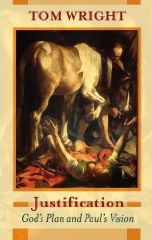Humans weren’t designed to know everything that’s happening in the world all the time: the despair, the suffering, the trials, the overwhelming injustices and the immensity of the problems in our modern industrialized, global society, can easily topple us emotionally and even spiritually. The Internet and its various information-pushing innovations over time, have all made it possible to know the massive tragedies in other countries, in real-time, in such a way that it can almost feel like the world is ending. All the time. Man can’t bear the weight of such knowledge.
Tag: first
 As this makes clear, Clement’s view of God’s involvement in His creation is not the one the Deists have set forth (the view many of our Founding Fathers in America held including Thomas Jefferson and Benjamin Franklin), that God is a watchmaker who created the universe, sat back and let things take their course. No, rather, God is intimately involved in all that takes place. Clement’s main point here is the peace and harmony with which God created and sustains His universe, not so much a discussion about God’s control over the negative things that take place. That’s for another discussion. What is clear here is Clement’s assumption of God’s meticulous, providential involvement in creation, from the largest thing to the smallest, including and especially with people, and even more importantly, His own people.
As this makes clear, Clement’s view of God’s involvement in His creation is not the one the Deists have set forth (the view many of our Founding Fathers in America held including Thomas Jefferson and Benjamin Franklin), that God is a watchmaker who created the universe, sat back and let things take their course. No, rather, God is intimately involved in all that takes place. Clement’s main point here is the peace and harmony with which God created and sustains His universe, not so much a discussion about God’s control over the negative things that take place. That’s for another discussion. What is clear here is Clement’s assumption of God’s meticulous, providential involvement in creation, from the largest thing to the smallest, including and especially with people, and even more importantly, His own people.
… Have your big scholarly brother step up and speak for you. 🙂
(Original): http://www.ivpress.com/cgi-ivpress/book.pl/review/code=3863 – I find some of these surprising and others not so much.
 In speaking of N.T. Wright’s new book, Justification: God’s Plan and Paul’s Vision, responding to and critiquing Piper’s defense of justification, entitled, The Future of Justification, itself critiquing Wright’s understanding of justification, McLaren says, “John Piper, it turns out, has done us all a wonderful favor. In writing the critique that invited this response, he has given Bishop Wright the opportunity to clearly, directly, passionately and concisely summarize many of the key themes of his still-in-process yet already historic scholarly and pastoral project. Wright shows–convincingly–how the comprehensive view of Paul, Romans, justification, Jesus, and the Christian life and mission that he has helped articulate embraces ‘both the truths the Reformers were eager to set forth and also the truths which, in their eagerness, they sidelined.’ Eavesdropping on this conversation will help readers who are new to Wright get into the main themes of his work and the important conversation of which it is a part. And it will give Wright’s critics a clearer sense than ever of what they are rejecting when they cling to their cherished old wineskins of conventional thought.” —Brian McLaren, author A Generous Orthodoxy
In speaking of N.T. Wright’s new book, Justification: God’s Plan and Paul’s Vision, responding to and critiquing Piper’s defense of justification, entitled, The Future of Justification, itself critiquing Wright’s understanding of justification, McLaren says, “John Piper, it turns out, has done us all a wonderful favor. In writing the critique that invited this response, he has given Bishop Wright the opportunity to clearly, directly, passionately and concisely summarize many of the key themes of his still-in-process yet already historic scholarly and pastoral project. Wright shows–convincingly–how the comprehensive view of Paul, Romans, justification, Jesus, and the Christian life and mission that he has helped articulate embraces ‘both the truths the Reformers were eager to set forth and also the truths which, in their eagerness, they sidelined.’ Eavesdropping on this conversation will help readers who are new to Wright get into the main themes of his work and the important conversation of which it is a part. And it will give Wright’s critics a clearer sense than ever of what they are rejecting when they cling to their cherished old wineskins of conventional thought.” —Brian McLaren, author A Generous Orthodoxy
